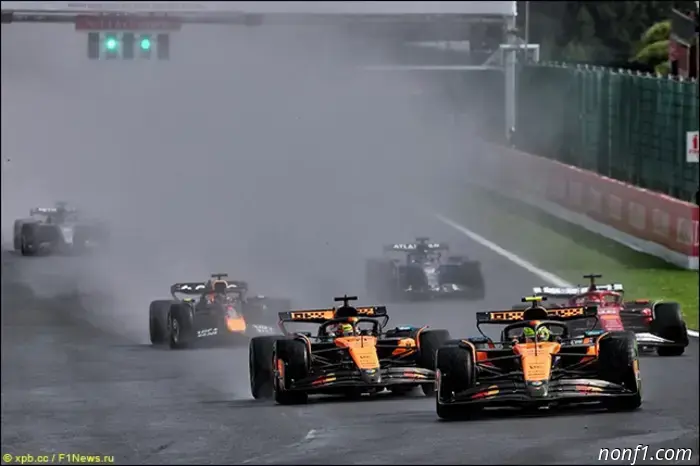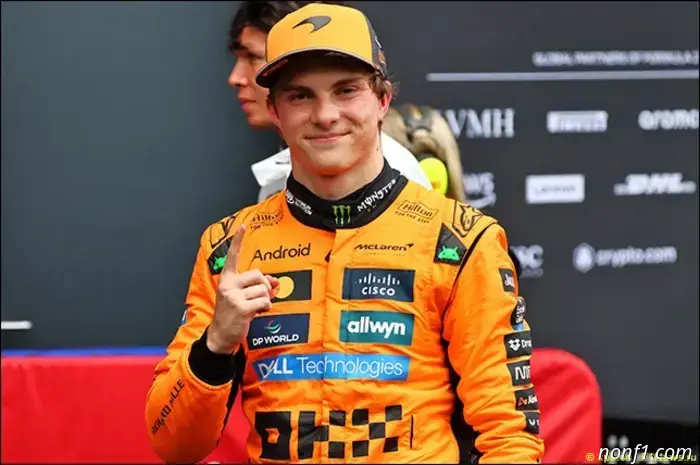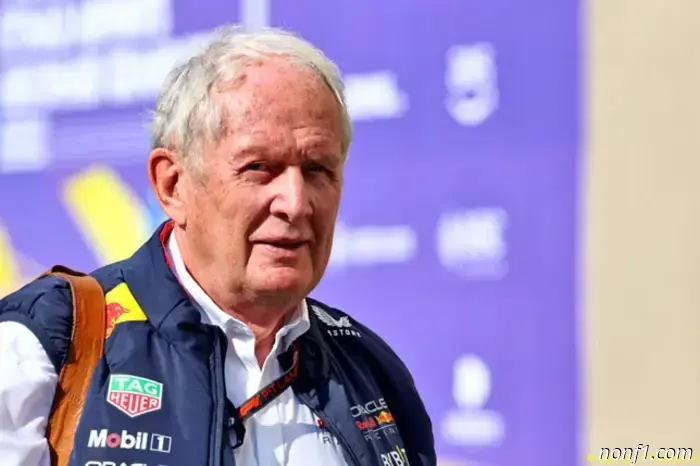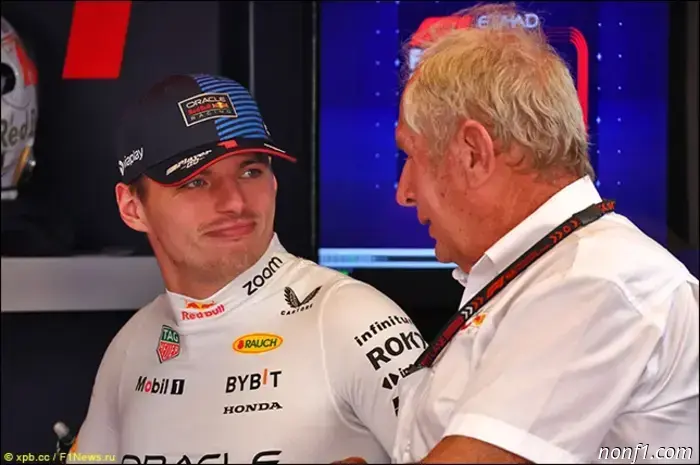
Martin Brandl on the results of the Belgian Grand Prix
Former Formula 1 driver and Sky Sports F1 commentator Martin Brundle summarized the Belgian Grand Prix...
On Sunday at Spa, Oscar Piastri demonstrated championship-level driving, reminiscent of Michael Schumacher, Lewis Hamilton, and Max Verstappen's achievements in the modern F1 era.
A minor mistake at Stavelot cost Oscar pole position—his teammate Lando Norris won the qualification, but at the start he did everything right—he bested him out of La Source, followed closely through Eau Rouge and Radillion, and took the race lead, which he never relinquished. This gave him a crucial advantage over Lando and during the pit stop.
FIA shouldn't have delayed the start for so long; ultimately, the race took place in much drier conditions than expected, causing the intermediate tires to quickly lose effectiveness.
Oscar switched to Medium tires, while Norris's team chose Hard, ensuring Lando wouldn't have to change tires again regardless. In response, Piastri had to adjust his driving and conserve tires for the remaining 70% of the race distance, which he did calmly and flawlessly, despite Norris increasingly closing in each lap. Piastri had to employ all his skill, which he did effortlessly.
Lando was unlucky to have to complete an extra lap on intermediate tires—McLaren teammates were driving too close, preventing a double pit stop. Afterwards, there was a delay during the pit stop. As Lando said in the room before the podium: "At that moment, I thought: 'Goodbye, Oscar'."
Trailing almost 10 seconds after the pit stop, Lando pushed like he was flying. Some laps, McLaren drivers were running one or two seconds faster than others. Norris had nothing to lose; he had to somehow prevent Oscar from conserving his tires, but the three mistakes we saw in the broadcast kept him from catching his teammate — he had to settle for second place and lose another eight points in the championship race.
I sense this trend all year: when all factors align, Lando is slightly faster, but Oscar is more consistent, makes fewer mistakes, and remains calmer in close battles. But it will be difficult for him in the final phase of the season.
Lando will need absolutely everything he has to win the title. We’ve seen times when two title contenders find extra motivation and a burst of speed in critical moments. It’ll be interesting to see if this happens in the next three sprints and the ten Grands Prix.
Max Verstappen, once again, did an excellent job, dismissing all the hype around his team, and won the sprint for the 12th time on Saturday morning. He set his car for high straight-line speed, using slipstream to get ahead at Les Combes, then defend his position. To do this, he had to maintain speed in the corners despite less downforce, which he mastered. It takes courage and skill.
Having paid a high price at Silverstone for a similarly low-downforce setup for qualifying, but then facing heavy rain during the race, Red Bull decided to use higher downforce for the main qualifying at Spa, which limited Max to fourth on Sunday, as their car seemed less effective in this configuration. He could no longer overtake opponents on the long climb to Les Combes.
Like many drivers, commentators, and fans, Max was very unhappy with race direction delaying the start until the track was nearly dry. Those who bet on high downforce due to the rain forecast felt unfairly disadvantaged.
Almost everyone watching F1 reasonably questioned the need for full wet tires, which due to extreme caution about visibility are almost never used. Moreover, will we ever see a classic rain race in F1 again?
It's important to understand whether there have been recent internal directives from FIA regarding this, or if race control is overly cautious on its own initiative. Racing involves risks; we can't simply eliminate them by only holding races in dry conditions. Drivers must manage the car and risks under any reasonable circumstances, but now the criterion of reasonableness leans toward extreme caution.
Ferrari updated their car, which paid dividends. Charles Leclerc performed excellently in both qualifying and the main race, finishing third and holding off Verstappen. Both finished twenty seconds behind McLaren, but nowadays that's a good result.
Lewis Hamilton endured two poor qualifying sessions: one after a rear axle lock-up, another for exceeding track limits, but in the race, he showed the old Lewis, advancing through the peloton after the start from the pit lane.
Mercedes had a disappointing weekend, but George Russell still finished fifth, 35 seconds behind the leader. We’re used to seeing them perform well in cool conditions; recently, he won the Canadian Grand Prix, so the team needs to understand what their latest updates deprived the car of its previous efficiency.
Kimi Räikkönen is going through a tough time driving the second Mercedes. In the last seven Grands Prix, he scored points only once—in Canada podium. It’s clear he’s feeling serious pressure on his young shoulders. He’s fortunate to have Toto Wolff’s backing; he may not fear for his career as much as young Red Bull drivers, but now he’s eagerly awaiting the summer break.
I still wonder why Mercedes didn’t give Kimi a couple of years to learn his craft under less pressure, as they did with George Russell. Kimi is a genuine talent, but he needs time.
Will Horner return as team owner?
After 20 years at the helm, Christian Horner no longer manages Red Bull. The abruptness of this decision shocked everyone, including himself. Christian did an outstanding job building the team and elevating it to a championship-dominating level with a stellar victory record.
When Dietrich Mateschitz, head and co-owner of Red Bull, passed away in 2022, it left a significant vacuum filled by others with their own ambitions, ideas, and egos. Dietrich was universally respected, had a bold vision and charisma, enabled people to showcase themselves, then delegated authority, always staying in the background.
One evening, I went with him to a major Red Bull event in Austria; he was driving his relatively modest car. A team member approached at the entrance to take his car, but I saw him politely decline, then park on a nearby field with others, and we walked from there. That left an impression on me.
The leadership he built upon learning of his incurable illness sought full control, as alleged, similar to Porsche’s approach during discussions of a partnership at the time.
Christian wanted total control over what he considered his creation. I suspect he overestimated his power, and once the support from the Yuvide family, owning 51% of shares, disappeared, the Austrian headquarters of Red Bull fired Horner at the first opportunity.
Considering other events following last year’s Bahrain race and the influence of Max’s extraordinarily powerful father, Jos Verstappen, the game was essentially over. But I am almost certain Horner will return—this time with guarantees of ownership rights and control.
Max will go into the summer break in third place in the drivers’ standings, so any speculation about breaking his contract based on team performance is irrelevant, but Red Bull wouldn’t have fired Horner if the Verstappen team wasn’t fully aware of the situation.
F1 is an extreme business that attracts extreme people.

Other articles
 Oscar Piastri: The race was not easy
Oscar Piastre confidently won the race at Spa, increasing his lead in the standings...
Oscar Piastri: The race was not easy
Oscar Piastre confidently won the race at Spa, increasing his lead in the standings...
 George Russell on FIA's decision to delay the start
George Russell supported the race management’s decision to postpone the start of Sunday's Formula 1 race until weather conditions improved.
George Russell on FIA's decision to delay the start
George Russell supported the race management’s decision to postpone the start of Sunday's Formula 1 race until weather conditions improved.
 Helmut Marco: Horner fired Mitzlaff
At Spa, Helmut Marko spoke about how everything will be arranged at Red Bull Racing after Christian Horner's departure...
Helmut Marco: Horner fired Mitzlaff
At Spa, Helmut Marko spoke about how everything will be arranged at Red Bull Racing after Christian Horner's departure...
 Marco: I can confirm – Verstappen is staying.
Red Bull consultant Helmut Marko has.closed the question of Max Verstappen leaving the team.
Marco: I can confirm – Verstappen is staying.
Red Bull consultant Helmut Marko has.closed the question of Max Verstappen leaving the team.
 The Madrid F1 race is encountering legal obstacles regarding the approval of its circuit.
Formula 1 | The upcoming Formula 1 street race in Madrid has encountered a legal obstacle, as a local court has accepted an appeal that contests the city's endorsement of the new (…)
The Madrid F1 race is encountering legal obstacles regarding the approval of its circuit.
Formula 1 | The upcoming Formula 1 street race in Madrid has encountered a legal obstacle, as a local court has accepted an appeal that contests the city's endorsement of the new (…)
Martin Brandl on the results of the Belgian Grand Prix
Former Formula 1 driver and Sky Sports F1 commentator Martin Brundle summed up the Belgian Grand Prix...
